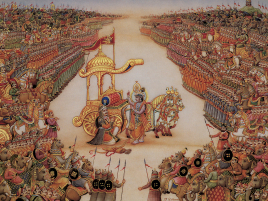Krishna Holy Book Faces Ban in Tomsk
By Alexander Bratersky | Dec 03, 2011

The book may be accused of expressing religious hatred, suppressing human dignity and declaring one religion superior to all others. But “Bhagavad Gita as It Is” can hardly be called Adolf Hitler’s “Mein Kampf.”
Still — if prosecutors in Tomsk have their way — the two may soon end up together on the Justice Ministry’s list of banned extremist literature.
Why the Hindu text central to the Hare Krishna faith has suddenly been targeted is unclear, but some suspect it is really an attack on the religious freedom of a group not well-regarded by the Russian Orthodox Church.
The case against the widely distributed book began in September when Tomsk prosecutors filed charges in the city’s Leninsky District Court saying the text attacks practitioners of other religions as “fools,” “demons” and “pigs.”
“‘Bhagavad Gita as It Is’ contains … calls for hostile activities against different social and religious groups, among them women and people who don’t follow Krishna,” the complaint reads.
Authorities in the Siberian city cited specific passages as evidence of extremist thinking.
“Those who, out of envy, disregard these teachings and do not practice them regularly are to be considered bereft of all knowledge, befooled and doomed to ignorance and bondage,” reads an excerpt of the book quoted in the complaint.
The prosecutor’s office even included a note from the local Federal Security Service office, listing the address of the Tomsk bookstore where the book could be purchased.
Yury Pleshakov, spokesman for the Russian branch of the International Society for Krishna Consciousness, said the whole case is absurd.
“It would be dangerous that along with [the book], a billion citizens of the world would be considered extremists,” he said, referring to the population of India where the book is considered a national treasure.
A spokeswoman for the Tomsk regional prosecutor’s office declined to comment, citing the ongoing investigation.
The case is currently on hold after Judge Galina Butenko ordered experts at Kemerovo State University in Tomsk to present further analysis, but it is expected to resume Thursday.
The actual “Bhagavad Gita” is vaguely dated between the fifth century BC and fifth century AD. The commentary included in the “as it is” edition, first published in 1968, was provided by guru Swami Prabhupada, founder of the International Society for Krishna Consciousness.
Curiously, the excerpt quoted by Tomsk prosecutors as extremist is from the original text and not Prabhupada’s commentary, which could pave the way for banning the ancient Hindu scripture.
Read more: http://www.themoscowtimes.com/news/article/krishna-holy-book-faces-ban-in-tomsk/448803.html#ixzz1fO5Mu3rY
The Moscow Times















